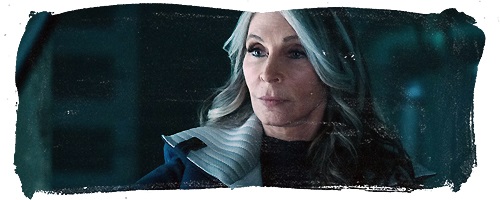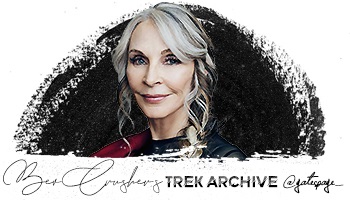
James Whitbrook
May 12, 2021
Gates McFadden’s career goes well beyond the ins and outs of the Enterprise sickbay. While she might be best known to sci-fi fans as Star Trek: The Next Generation’s iconic Dr. Beverly Crusher, McFadden’s taught, acted on stage and screen, worked on Jim Henson hits like Labyrinth, and more. Now, she’s picking up a new skill: interviewer of other Star Trek icons.
The first podcast from the Nacelle Company—the production team behind documentary series like The Toys That Made Us, Down to Earth With Zac Efron, and Disney+’s Behind the Attraction—dropped today and sees McFadden reminisce with notable Star Trek creatives from across the franchise’s history. The 10-episode series includes guests like LeVar Burton, Jonathan Frakes, Marina Sirtis, and many more from TNG, but also Voyager and Deep Space Nine favorites, including Robert Picardo and Nana Visitor.
To celebrate the launch of the series, io9 spoke to McFadden to learn about picking up podcasting as her latest hobby in a long career, what Star Trek’s resurgence means to her and to the franchise, and why she wanted her Trek-heavy guest list to still feel fresh and unique to listeners who aren’t fans of the long-running sci-fi franchise.
James Whitbrook, io9: Why was now the time you wanted to do a series like this?
Gates McFadden: Because I was asked! And I actually turned it down twice! Because I couldn’t figure out, “why now?” Brian Volk-Weiss, who is the CEO of Nacelle, is the one who called me out of the blue. I didn’t know him—and he was so charming that he just charmed me into doing this. And I am loving it, I am so glad he did. It seems like the perfect time that it happened during the pandemic because you can record remotely. Sometimes we’d—he’d built a studio, so sometimes we were in, recording some of the beginning ones in the studio… but I think I’m finding my way. I have such wonderful friends, that it’s just fabulous to share our friendship with people, and also try to highlight them. It’s pretty amazing, the group of actors who’ve been involved with the Star Trek franchise. We’re all very close, actually, it’s unusual. I think every conversation, I’ve learned something more about my friends that I didn’t know and I hope the people who listen to the podcast feel the same way.
io9: You’ve had an extensive career both in front of and behind the camera—this is a relatively new situation for you, to have to guide these conversations. What has that process been like for you?
McFadden: I actually love to research things, I’m curious. So even though I know all the things my friends have done, I love to try to find new things I didn’t know about them. And even if I didn’t ask questions, it’s always fun to revisit something they’ve acted in or done. You have to know how to guide it, but I didn’t just want it to be an interview—I didn’t just want to say, “Okay, LeVar [Burton, who played Geordi LaForge on The Next Generation], I’m going to interview you.” I wanted it to be something that was also a conversation and showed our closeness—that we could laugh and joke and all of a sudden, something powerful might come up. And that has happened, I would say, which is exciting. You can go from something that’s very serious, to funny and it absolutely shows our shared history, how we’re dealing with each other. So hopefully that’s the way people will hear it as well. I was nervous in the beginning because I hadn’t done it, then once I learned how to edit sound, I’ve been doing the editing—a wonderful fellow looks over what I’ve done and refines it, but I’m making the choices on the edit. I’ve spent quite a bit of time on it! I’ve learned a lot. In a lot of ways, it’s about finding things that make it flow better… it’s just like anything, like directing, you get into it and it’s similar. I think, sometimes, it’s more like I’m interviewing, sometimes it’s just like we’re having… there’s no there, controlling the conversation as much. Which is really kind of cool.
io9: You said you’ve drawn quite the roster of friends over the years, not just your colleagues on TNG, it’s people involved with the Star Trek franchise at large—both in front of and behind the camera. Has it changed anything about your perspective of yours and theirs places in the franchise?
McFadden: Amazing, isn’t it? It’s truly amazing. It became clear to me when many of us, from all the different shows, were on different Zooms [last year] raising money for the Democratic candidate for president, Joe Biden. It really hit me when I saw all of these intelligent people on this big Zoom call, and I was so honored to be part of it. I thought, “Boy, the casting people—and the producers—they really had something in their minds,” because every single one of these people I’d want to get to know. They all seem to be passionate about making the world a better place, working for change, really walking the walk, and not just doing something in an occasional interview. I really think it’s quite a stellar group of people.
The more of the cast members I met, either from Discovery or Picard, the more this pans out for me. I got to work with Ethan Peck—we were improvising together on something, where I was Kirk and he was Spock—on the [official Star Trek] cruise. I had a blast with him. We just totally clicked. And you hang out afterwards and you get to know people from all different shows. It’s been decades I’ve known John de Lancie, and Robert Picardo, and Nana Visitor— people like that. Some people like Denise [Crosby, TNG’s Tasha Yar] and Brent [Spiner, TNG’s Data], I’ve directed in things. So, there’s a lot of ways we intersect in our lives. It’s very unusual, it seems to me, to have a franchise where so many people get along so well.
io9: Trek aside, one thing that fascinated me to discover with this is your history with the Jim Henson Company as a choreographer on Labyrinth. Is that part of your career something you’d like to explore in the podcast, beyond your chats with people from Star Trek history?
McFadden: I don’t know—I haven’t thought that far ahead. There’s so many Star Trek people I could still talk to, really. Before Labyrinth, I had some acting in New York for years and had been teaching at a lot of drama universities and programs all over the United States, and done a lot of theater, a lot of different things. That was more of a fluke that I got asked to do that, and I took it because I was told by Jim I could also play Jennifer Connelly’s mother in the movie—but British Equity would not allow it. Even though that was the reason I took the job and had, for two years, been thinking that was what was going to happen. They would not allow us. Whereas in American Equity, British actors all the time act in our shows, so… that was a disappointment that I didn’t find that out until I was already over in London, working as choreographer.
io9: To bring it back to Star Trek, you get to talk to your friends as friends here, rather than as stars of the franchise. What’s surprised you most about them connecting in a format like this?
McFadden: Well, I think the thing that stood out to me most is how difficult it is to hear yourself while doing a podcast. It’s sort of an existential dilemma! There’ve been surprises—like, with Wil Wheaton, I tried to play games with him because he’s just a good podcast host. I wanted to not have it so he felt like he was being interviewed, or interviewing me, so, I made us play games. Things like “Never Have I Ever” or answer ethical questions. Really surprising things came up. I learned so much about him, that was super fun. I learned stuff about Jonathan [Frakes, TNG’s Commander Riker]. You know, like dinner time at Jonathan’s house, and how he and his dad behaved one day… really things I’d never heard before, these stories. I hope people who listen will enjoy it as much as I did doing it. We’ll see. I thought better to try something and fail than not try at all. That’s what I was doing. I had a blast!
io9: You’re doing this at an interesting time for Star Trek—what’s it been like for you, seeing Star Trek become really big again in a way it hasn’t been for a while?
McFadden: I think it’s very, very wonderful. I’m quite thrilled to see Star Trek being embraced so much. The show does talk about our collective future in a way that there is inclusion and more tolerance and seeking for answers—the search for answers instead of just judgemental, “This is wrong. This is right,” but being able to hold contradictions. The thing that I always loved about Star Trek is that it teaches people how to think and discuss things collectively, and that is what we need to do if there is going to be a future if we ever work together to solve some of our crises—be it economic or environmental. So, I’ve loved it. Even if I could go back to the Next Generation, the very idea that there was a character like Wesley Crusher… I think that was such a prophecy of what was coming with young people, and technology, and how they are coming up with robotic things and all sorts of stuff. We have the rover on Mars—what it’s capable of doing it astonishing!
I think that that is why Star Trek is popular. I think all of the generations that followed ours—someone I talked to today, he was seven when he first saw “Encounter at Farpoint,” and technology is totally a part of his life. So, it makes sense it’s come back because that is where it was when we started our show from when the original started. It’s about the future. The writers talked to scientists and people who were futurists—that was their title—and look at all the things that we have now in technology, like the cell phone, and many other things. And that’s just going to happen more and more. So why not be involved in a show that talks about the future in a positive way? I would say that’s why it’s more popular now. We really have seen how some of the things we’re talking about have come to fruition. And that is going to happen more and more if we work together and think about these problems in a positive way.














